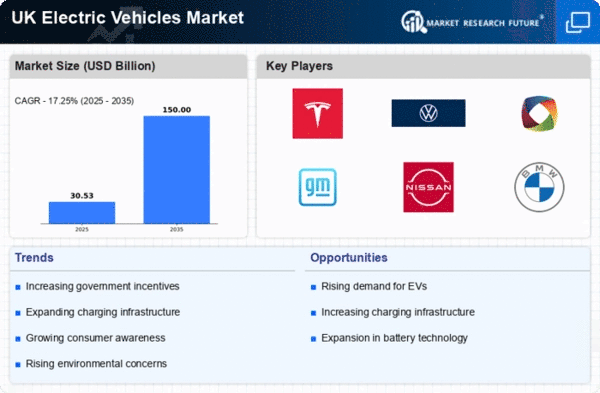Rising Environmental Awareness
The electric vehicles market in the UK is experiencing a notable surge in demand, driven by increasing environmental consciousness among consumers. As awareness of climate change and air pollution grows, individuals are more inclined to adopt sustainable transportation options. This shift is reflected in the UK government's commitment to achieving net-zero carbon emissions by 2050, which has led to a projected increase in electric vehicle sales. In 2025, electric vehicles are expected to account for approximately 30% of new car registrations, highlighting a significant transformation in consumer preferences. The electric vehicles market is thus poised to benefit from this heightened focus on sustainability, as consumers seek to reduce their carbon footprints and contribute to a cleaner environment.
Economic Incentives for Consumers
The electric vehicles market in the UK is benefiting from various economic incentives aimed at encouraging consumer adoption. The UK government has implemented schemes such as the Plug-in Car Grant, which offers financial support for purchasing electric vehicles. As of November 2025, this grant provides up to £2,500 off the purchase price of eligible electric vehicles, making them more accessible to a wider demographic. Additionally, many local authorities are introducing incentives such as reduced road taxes and free parking for electric vehicle owners. These economic measures are likely to stimulate demand within the electric vehicles market, as consumers are increasingly motivated by the financial benefits associated with electric vehicle ownership.
Advancements in Charging Technology
The electric vehicles market in the UK is significantly influenced by advancements in charging technology. Innovations such as ultra-fast charging stations and wireless charging solutions are enhancing the convenience of electric vehicle ownership. As of November 2025, the UK boasts over 40,000 public charging points, a figure that continues to grow as infrastructure investments increase. This expansion is crucial for alleviating range anxiety among potential electric vehicle buyers. The electric vehicles market is likely to see a further boost as charging times decrease, making electric vehicles more appealing to a broader audience. Enhanced charging solutions not only improve user experience but also support the overall growth of the electric vehicles market.
Corporate Sustainability Initiatives
The electric vehicles market in the UK is increasingly influenced by corporate sustainability initiatives. Many businesses are adopting electric vehicles as part of their corporate social responsibility strategies, aiming to reduce their carbon emissions and enhance their public image. In 2025, it is estimated that over 20% of corporate fleets in the UK will consist of electric vehicles, reflecting a significant shift in corporate transportation policies. This trend is further supported by the electric vehicles market, which offers a range of models suitable for various business needs. As companies prioritize sustainability, the demand for electric vehicles is expected to rise, contributing to the overall growth of the market.
Improved Vehicle Performance and Range
The electric vehicles market in the UK is witnessing a transformation in vehicle performance and range, which is crucial for consumer acceptance. Recent advancements in battery technology have led to electric vehicles that can travel over 300 miles on a single charge, addressing one of the primary concerns of potential buyers. As of November 2025, several models in the market offer impressive acceleration and handling, rivaling traditional combustion engine vehicles. This improvement in performance is likely to attract a broader audience to the electric vehicles market, as consumers seek vehicles that not only reduce emissions but also deliver an enjoyable driving experience. The combination of enhanced range and performance is expected to drive further growth in the electric vehicles market.
















